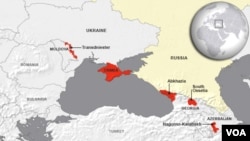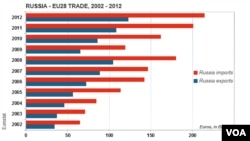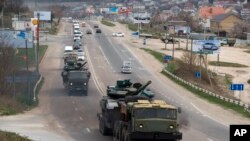President Barack Obama said Russia was acting "out of weakness" and not strength in its annexation of Crimea from Ukraine.
In comments to reporters following a nuclear summit in The Hague Tuesday, Obama said the international community would never recognize Russia's takeover of Crimea, while adding that a military response from the West was unlikely.
The U.S. leader said Washington is still concerned about "further encroachment" into Ukraine by Russia.
On Monday, leaders from the U.S. Britain, Canada, France, Germany, Italy and Japan said they were suspending their participation with Russia in the G8, until Moscow "changes course."
Russian news agencies quote a Kremlin spokesman as saying Russia is ready for and interested in continuing contacts with its fellow G8 countries.
On the same day the U.S. president made those remarks, Russia staged military training exercises in Transdniestria, a breakaway region of Moldova.
NATO's top military commander also expressed concern Sunday that after seizing Crimea, Moscow might have its eye on the mostly Russian-speaking region that borders western Ukraine.
Speaking alongside Dutch Prime Minister Mark Rutte, Obama said that Crimea being a part of Russia is not a "done deal" because it violates international law.
"We're not recognizing what has happened in Crimea," he said, adding sanctions against Russia may deepen into energy and trade sectors. "It is up to Russia to act responsibly and show itself once again to be willing to abide by international norms and...if it fails to do so, there will be some costs."
For now, however, Obama and fellow G7 leaders have decided against more damaging economic sanctions unless Russia shows further aggression and goes beyond the seizure of Crimea.
Obama said he believes if Ukrainians had a choice, they would seek to have a relationship with both Europe and Russia.
The U.S. president also said all NATO nations have assurances that they will continue to be protected under the alliance's security guidelines.
Rutte, the Danish prime minister, said he cannot envision the Crimea situation ending in a military conflict.
"This is a difficult issue. It can't be solved overnight," said Rutte, who also commended Obama's leadership.
Obama also said he doesn't consider Russia to be the number one U.S. national security threat and that he is more concerned about the possibility of a nuclear bomb going off in New York.
'Counterproductive'
Russia, meanwhile, has dismissed as "counterproductive" a move by world powers to cut Moscow out of the Group of Eight industrialized nations over its actions in Ukraine. The spokesman for Russian President Vladimir Putin made the comment one day after the seven other G-8 nations agreed to hold their own Group of Seven summit in June instead of attending the previously-planned G-8 meeting in Russia.
In a joint statement issued on the sidelines of the nuclear summit in The Hague, Netherlands, the leaders of the U.S., Britain, Canada, France, Germany, Italy and Japan said they were suspending their participation with Russia in the G-8, until Moscow "changes course." Western powers have been moving to isolate Russia over its annexation of the Crimean peninsula from Ukraine.
Russian news agencies quote the Kremlin spokesman as saying Russia is ready for and interested in continuing contacts with its fellow G-8 countries. But Russian Foreign Minister Sergei Lavrov said Monday it would be "no great tragedy" if Russia were dropped from the coalition.
Lavrov met his Ukrainian counterpart Andriy Deshchytsia Monday on the sidelines of the nuclear summit. It was their first meeting and the highest-level meeting yet between the Russian government and the new Ukrainian government.
On Monday, Russian Defense Minister Sergei Shoigu toured Russian military headquarters in Crimea, as Russian forces seized Ukraine's last military base on the peninsula and Ukrainian forces withdrew.
Late Monday, Russia's Ria Novosti news agency quoted Crimea's deputy prime minister as saying all military units in the peninsula are now under the control of the Russian military.
Images from Ukraine and Crimea
Troop movements
Ukraine's Secretary for National Security, Andriy Parubiy, tells VOA that about 100,000 Russian troops and armor are poised along Ukrainian borders and remain on full alert.
That troop presence on Ukraine's eastern and southern borders has triggered alarm in Kyiv. It also has spawned warnings from NATO that Moscow may be seeking to expand its territorial reach into another pro-Russian territory on Ukraine's southwestern border - Transdniester.
For its part, Moscow has insisted the border troops are conducting maneuvers, and says there are no plans to cross into Ukraine.
Ukraine has remained highly unstable since November, when then-President Viktor Yanukovych backed off from signing a trade agreement with the European Union in favor of closer ties with Russia. The move led to weeks of anti-government protests in Kyiv that forced Yanukovych to flee the country last month.
Crimeans voted last week in a highly controversial ballot to secede from Ukraine and join the Russian Federation, a move quickly embraced by Russian President Putin. The United States and the European Union say the vote violates Ukraine's constitution and is illegal.
In comments to reporters following a nuclear summit in The Hague Tuesday, Obama said the international community would never recognize Russia's takeover of Crimea, while adding that a military response from the West was unlikely.
The U.S. leader said Washington is still concerned about "further encroachment" into Ukraine by Russia.
On Monday, leaders from the U.S. Britain, Canada, France, Germany, Italy and Japan said they were suspending their participation with Russia in the G8, until Moscow "changes course."
Russian news agencies quote a Kremlin spokesman as saying Russia is ready for and interested in continuing contacts with its fellow G8 countries.
On the same day the U.S. president made those remarks, Russia staged military training exercises in Transdniestria, a breakaway region of Moldova.
NATO's top military commander also expressed concern Sunday that after seizing Crimea, Moscow might have its eye on the mostly Russian-speaking region that borders western Ukraine.
Speaking alongside Dutch Prime Minister Mark Rutte, Obama said that Crimea being a part of Russia is not a "done deal" because it violates international law.
"We're not recognizing what has happened in Crimea," he said, adding sanctions against Russia may deepen into energy and trade sectors. "It is up to Russia to act responsibly and show itself once again to be willing to abide by international norms and...if it fails to do so, there will be some costs."
For now, however, Obama and fellow G7 leaders have decided against more damaging economic sanctions unless Russia shows further aggression and goes beyond the seizure of Crimea.
Obama said he believes if Ukrainians had a choice, they would seek to have a relationship with both Europe and Russia.
The U.S. president also said all NATO nations have assurances that they will continue to be protected under the alliance's security guidelines.
Rutte, the Danish prime minister, said he cannot envision the Crimea situation ending in a military conflict.
"This is a difficult issue. It can't be solved overnight," said Rutte, who also commended Obama's leadership.
Obama also said he doesn't consider Russia to be the number one U.S. national security threat and that he is more concerned about the possibility of a nuclear bomb going off in New York.
'Counterproductive'
Russia, meanwhile, has dismissed as "counterproductive" a move by world powers to cut Moscow out of the Group of Eight industrialized nations over its actions in Ukraine. The spokesman for Russian President Vladimir Putin made the comment one day after the seven other G-8 nations agreed to hold their own Group of Seven summit in June instead of attending the previously-planned G-8 meeting in Russia.
In a joint statement issued on the sidelines of the nuclear summit in The Hague, Netherlands, the leaders of the U.S., Britain, Canada, France, Germany, Italy and Japan said they were suspending their participation with Russia in the G-8, until Moscow "changes course." Western powers have been moving to isolate Russia over its annexation of the Crimean peninsula from Ukraine.
Russian news agencies quote the Kremlin spokesman as saying Russia is ready for and interested in continuing contacts with its fellow G-8 countries. But Russian Foreign Minister Sergei Lavrov said Monday it would be "no great tragedy" if Russia were dropped from the coalition.
Lavrov met his Ukrainian counterpart Andriy Deshchytsia Monday on the sidelines of the nuclear summit. It was their first meeting and the highest-level meeting yet between the Russian government and the new Ukrainian government.
On Monday, Russian Defense Minister Sergei Shoigu toured Russian military headquarters in Crimea, as Russian forces seized Ukraine's last military base on the peninsula and Ukrainian forces withdrew.
Late Monday, Russia's Ria Novosti news agency quoted Crimea's deputy prime minister as saying all military units in the peninsula are now under the control of the Russian military.
Images from Ukraine and Crimea
Troop movements
Ukraine's Secretary for National Security, Andriy Parubiy, tells VOA that about 100,000 Russian troops and armor are poised along Ukrainian borders and remain on full alert.
That troop presence on Ukraine's eastern and southern borders has triggered alarm in Kyiv. It also has spawned warnings from NATO that Moscow may be seeking to expand its territorial reach into another pro-Russian territory on Ukraine's southwestern border - Transdniester.
For its part, Moscow has insisted the border troops are conducting maneuvers, and says there are no plans to cross into Ukraine.
Ukraine has remained highly unstable since November, when then-President Viktor Yanukovych backed off from signing a trade agreement with the European Union in favor of closer ties with Russia. The move led to weeks of anti-government protests in Kyiv that forced Yanukovych to flee the country last month.
Crimeans voted last week in a highly controversial ballot to secede from Ukraine and join the Russian Federation, a move quickly embraced by Russian President Putin. The United States and the European Union say the vote violates Ukraine's constitution and is illegal.








